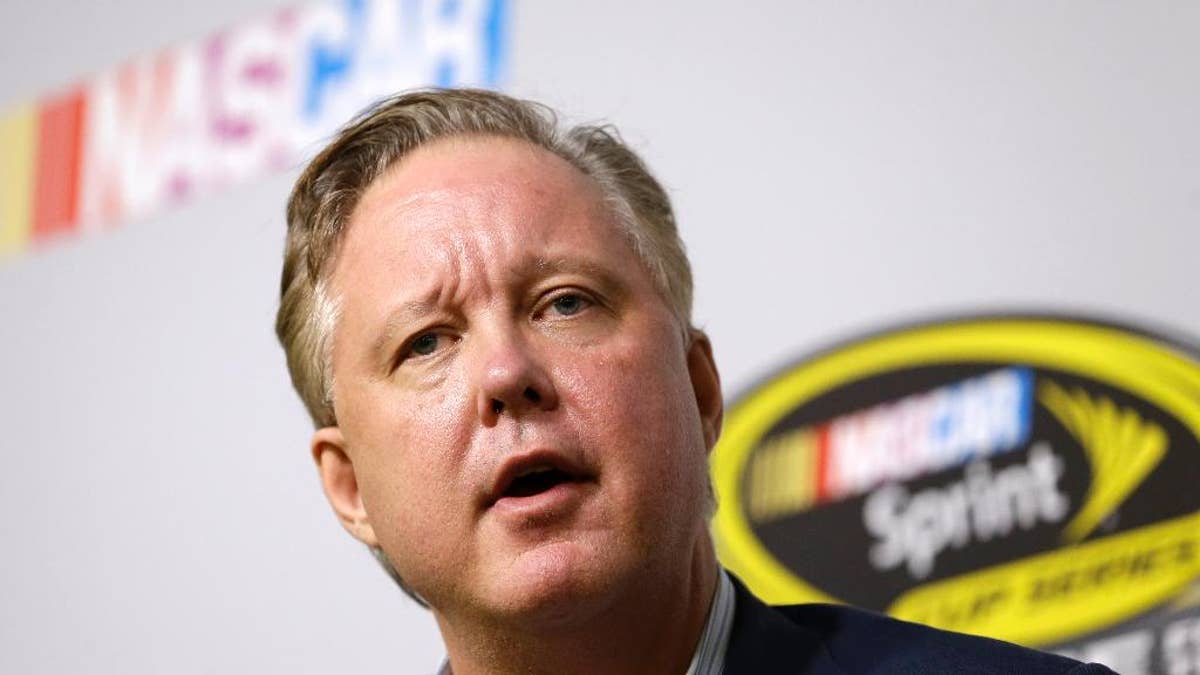
FILE - In this Nov. 20, 2015, file photo, Brian France, NASCAR Chairman and CEO, talks to reporters at a news conference during NASCAR Championship auto racing weekend at Homestead-Miami Speedway in Homestead, Fla. At a time when other sports are leading the charge toward a brighter social future, the good ol' boys seem intent on returning us to a more divisive era. (AP Photo/Alan Diaz, File) (The Associated Press)
So much for trying to be inclusive, NASCAR.
At a time when other sports are leading the charge toward a brighter social future, the good ol' boys seem intent on returning us to a more divisive era.
Might as well bring back those Confederate flags, while they're at it.
NASCAR has been on quite a roll — from blacks-were-so-happy-during-segregation revisionist Phil Robertson delivering a political endorsement posing as prayer before a Texas race, to Tony Stewart being fined $35,000 for having the gall to question whether the governing body cared about the possibility of a tire flying into the crowd — and bumbling Chairman Brian France is taking the sport to entirely new depths.
While not at all hesitant about joining white supremacist groups in publicly supporting Donald Trump for president, France took his sweet time getting around to addressing a new law in North Carolina that essentially formalizes discrimination against lesbian, gay and transgender people.
After no comment on the issue for the better part of a month, despite Charlotte being the sport's epicenter, France was finally given the chance to take a stand during a meeting Thursday with the Associated Press Sports Editors.
France whiffed completely.
He started out by bragging that NASCAR opposed a similar law in Indiana, before devolving into some tortured logic about why NASCAR wouldn't do the same in North Carolina.
"In this instance, we take the position that any discrimination, unintended or not, we're on the other side, we don't like that," France said. "We are working, including myself, behind scenes to the extent, again, we're not a political institution, we don't obviously set political agendas and write laws, but to the extent we can, express our values to policy makers — in this case, North Carolina, we will and we do."
That mess of an answer was especially striking, given what NBA Commissioner Adam Silver said when he spoke to APSE journalists. Silver made it clear the NBA would move next year's All-Star Game out of Charlotte without significant revisions of the law.
NASCAR could deliver an even more forceful economic blow, given the organization has offices and its hall of fame in Charlotte, most of the teams are based in the area, and Charlotte Motor Speedway is host to one of the biggest races of the year on Memorial Day weekend.
But France wasn't going there.
Not even close.
"We try to be part of a solution, not part of a bunch of threats. Truthfully," he said, his nose likely growing on every word. "But we're very direct about it and I think, we just do our part. We always like to think we take a lot out of the communities that run our events and do business in North Carolina. Case in point, when we're asked to put back into these communities, be a part of these communities, big decisions and small decisions, we want to be there doing that."
As if realizing he was getting backed into a corner, France concluded by trying to make the case that NASCAR really didn't have that much influence over the affairs of North Carolina, which would be news to taxpayers who helped fund the money draining Hall of Fame.
"We're just one small piece of the fabric," he insisted. "We want to play our role but not overstate our role."
Of course, NASCAR was willing to take a much more decisive stand when Stewart, a three-time Cup champion and one of the sport's most outspoken figures, had the nerve to criticize a potential safety hazard. At a sponsor appearance Wednesday, Smoke complained about the organization not policing teams that don't apply all five lug nuts during pit stops, a tactic that gets their cars back on the track quicker but has led to a rash of loose wheels the last two races.
Instead of thanking Stewart, NASCAR quickly doled out a ludicrous fine for criticizing the organization. Some of Stewart's fellow drivers were so outraged that they quickly agreed to go in together to pay the $35,000.
What should make this lack of coherent leadership even more troubling to NASCAR fans is the sport isn't exactly thriving at the moment. Television ratings are slumping, fewer cars are entering races, and tracks are plagued by thousands of empty seats.
Just this past weekend at Bristol, the bull-ring of a track that once had a wait list for tickets, the place looked about half full. Not counting rainouts, TV ratings were the lowest for the track's spring race since it moved to Fox in 2001, continuing a disturbing trend that began with the season-opening Daytona 500.
Stock car racing has always been viewed through a regional, homogenous microscope, going back to his bootlegging roots in the Jim Crow South. France has tried to shore up that image at times, most notably working to stamp out the prevalence of the Confederate battle flag in the wake of the Charleston massacre. But these latest developments are indicative of a sport increasingly out of touch with the modern world.
The NFL made it clear that future Super Bowls might not be held in Atlanta if the state approved a religious exemptions law, a stand that helped push the governor into a veto.
The NBA is following a similar path in North Carolina.
Then there's NASCAR, which is clearly heading in the wrong direction.
___
Paul Newberry is a national writer for The Associated Press. Write to him at pnewberry@ap.org or at www.twitter.com/pnewberry1963 . His work can be found at http://bigstory.ap.org/content/paul-newberry .
